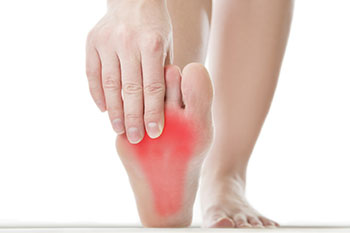
Plantar Fasciitis Treatment in North Texas
The ligament that runs along the base of the foot and connects heel bones to the front of the foot and supports the arch is known as plantar fascia. It serves as a shock absorber for the feet. When it is over-stressed, it can lead to tears in the tissue.
Plantar fasciitis is a common cause of heel pain involving inflammation of the plantar fascia.
Plantar fasciitis generally causes sharp pain when you take your first steps in the morning. The pain typically decreases as you move around and may return after you’ve been standing for a long time or when you stand up after sitting for a long time.
Causes of plantar fasciitis
The major cause of plantar fasciitis is too much stress or pressure exerted on the heel and foot. Repeated force or pressure can make the ligament become inflamed. Wearing high heels can also cause excess pressure on the heel and could cause inflammation to the ligament.
Risk factors
Individuals with flat feet are at higher risk of developing plantar fasciitis. This is because flat feet cause uneven weight distribution on the feet when you walk and exert more pressure and stress on the fascia. Individuals whose jobs require long hours of standing or walking are also at greater risk of developing plantar fasciitis. Individuals who wear high heels or shoes that are not balanced are at high risk of developing the condition. Wearing high heels causes more pressure on the heels which could cause inflammation of the ligament.
Athletes who are always running, jogging or jumping also have a higher risk of developing the condition. Sprinters, ballet dancers, aerobic dancers and footballers are at higher risk because they exert greater pressure on their feet. Individuals who are between the ages of 40 and 60 are also more prone to developing plantar fasciitis. And individuals who are overweight exert greater pressure on their feet, which could lead to plantar fasciitis.
Symptoms
Individuals with plantar fasciitis usually feel stabbing pain beneath their feet close to their heel. The pain is worse during those first few steps after waking up. The pain may decrease as you continue walking, then worsen when you stand or walk for a long period of time. You may also feel worse pain after exercise. This pain may cause you to walk abnormally. Knee, hip, and back problems may develop from walking abnormally for a long period of time.
Diagnosis
Your foot doctor will review your medical history and conduct a physical examination. He or she will examine your foot for areas of tenderness and pain and may ask you to walk around to check your gait for abnormalities. We may also conduct imaging tests such as X-ray, MRI, or CT scan so we can study the internal structure of your bones looking for fractures or pinched nerves.
Home Treatments
There are different treatment options for plantar fasciitis. Depending on the severity of your condition, you may treat it with home remedies or seek medical help. Your treatment options include home remedies, self-service treatments you can do at home if your condition is not severe. Home remedies include:
Apply ice: Apply ice packs three to four times a day for about 15 minutes each time for pain relief. Wrap your ice packs in a damp towel before placing them on your heel.
Use non-steroidal anti-inflammatory drugs (NSAIDS): Using NSAIDS helps reduce discomfort and inflammation.
Splints: Wearing a splint at night before bed can help reduce pain and discomfort by helping to stretch your arch and calf muscles.
Orthotics: Foot orthotics are specially designed to support the foot. Orthotics support the arch and help distribute your weight evenly when walking, running or standing.
Reduce activity: Reduce high-impact activities such as sprinting, jumping and other high-impact exercises.
Medical Treatments
Medical treatments are required for severe cases after home remedies have failed to provide adequate pain relief. Medical treatment options include:
Steroid injections: We administer steroid injections when your pain is severe and persistent. We inject an anti-inflammatory steroid medication into the painful heel to help eliminate pain and reduce inflammation.
Prescription medications: Our doctors may prescribe pain killers to reduce your pain.
Exercise: Certain exercises can help relieve foot pain. Stretching exercises such as yoga can help reduce heel pain and even prevent plantar fasciitis. We recommend seated fascia stretches, seated ankle pumps, and standing calf stretches to relieve pain.
Physical therapy: Your physical therapist can help you engage in exercises that will ease your pain. Exercises that stretch the plantar fascia and Achilles tendon can strengthen lower leg muscles and help stabilize your heel and ankle.
Extracorporeal shock wave therapy: This procedure uses sound waves to treat heel pain and stimulate healing when you have chronic plantar fasciitis that is not responding to other treatment options. However, this procedure hasn’t proven to be consistently effective and may cause swelling, numbness or pain.
Surgery: Foot surgery is the last resort when all other treatment options have failed. Our foot surgeon offers different surgical procedures for severe plantar fasciitis.
Prevention
You can prevent plantar fasciitis by maintaining a healthy weight, wearing comfortable shoes with good arch support and insoles and avoiding going barefoot on hard floors. If you are an athlete, always wear comfortable shoes with good shock absorbency. Don’t stand, walk or run for long periods of time, and always change positions to avoid exerting too much pressure on your feet. Avoid high-impact sports or activities that require extreme force exerted on the heel and foot. Engage in more in low-impact sports and activities.
Need relief from the pain of plantar fasciitis? Schedule an appointment with Graff Foot Ankle and Wound Care. Call (972) 403-7733 today or use our convenient Request an Appointment form to schedule your visit.
